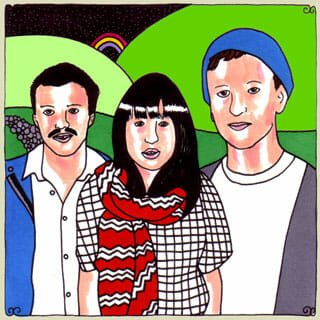- Welcome to Daytrotter
- In Hawaii
- Rabbit Holes
- Skipping Stones
- Rainbow
When I go into a basement – my own, someone else’s – even if the lights are all still on, I sprint to get to the top of the steps. It’s the fear of what’s behind my back – which has always been nothing, just empty rooms, with a dampened smell to them, concrete foundation floors, the furnace. It’s a looming sensation about presence and about other possible presences that rattles me up pretty good, even if it’s a known tic of idiotic weirdness. It still spooks me to the core. Being spooked in more of a controlled and handled way is Joan Tick, a New Yorker who makes music under the moniker Treasure. She sounds spooked, but she sounds as if she almost prefers it – as if it could be something that she’s reasoned through and determined is a feeling that she likes to have around, even if it’s full of dreariness.
Treasure music is rife with moments of dragged existence, when you’re here, you’re living, you’re trying as hard as you can to be a somebody and there’s just no caring. There’s no spotlight to jump under and there’s no praise out there for you. It’s an existence that falls somewhere between no one knowing who you are and only a few people knowing who you are. It can be sublime, this ability to walk where you want to walk, sit and be where you want to sit and be and not having another living soul give a damn about what you’re doing. There’s something like freedom in that, but anonymity is only a way to live for so long before it takes a greater toll on you. It has to thaw out and become a little warmer after some time.
Tick sings beautifully, mopingly on her debut album, “Tea Parties,” giving us all of the many splendored feelings of being lost in a gigantic ocean, being looked at from the moon. There’s just no that much mind paid to the primary characters who inhabit her songs. They act alone and they’re adrift alone, silently plodding on, doing whatever they’d like to be doing. She sings, “After all, people come and people go,” suggesting the transient nature of how it is and then she gets even more personal, maybe with these lines from “My Feather”: “On the street, no one talks to me/They walk past my evil eye and my feather/Hello white wall, can you talk to me?/Can you make another black shadow of me and my feather/My poisonous feather.” It’s this creeping and crawling sense of nothingness, just the shadow cast onto a wall or the ground, a plate left behind at a restaurant – a knife with a smear of butter, a fork with the juices and fat from a steak still on it, a spoon with soup crust stuck to the edge, a rumpled napkin thrown overtop of it all – left behind at a table set for one, that’s scary too, and moving. It makes us feel for those people in her songs, who believe that they’re leaving no impression.
